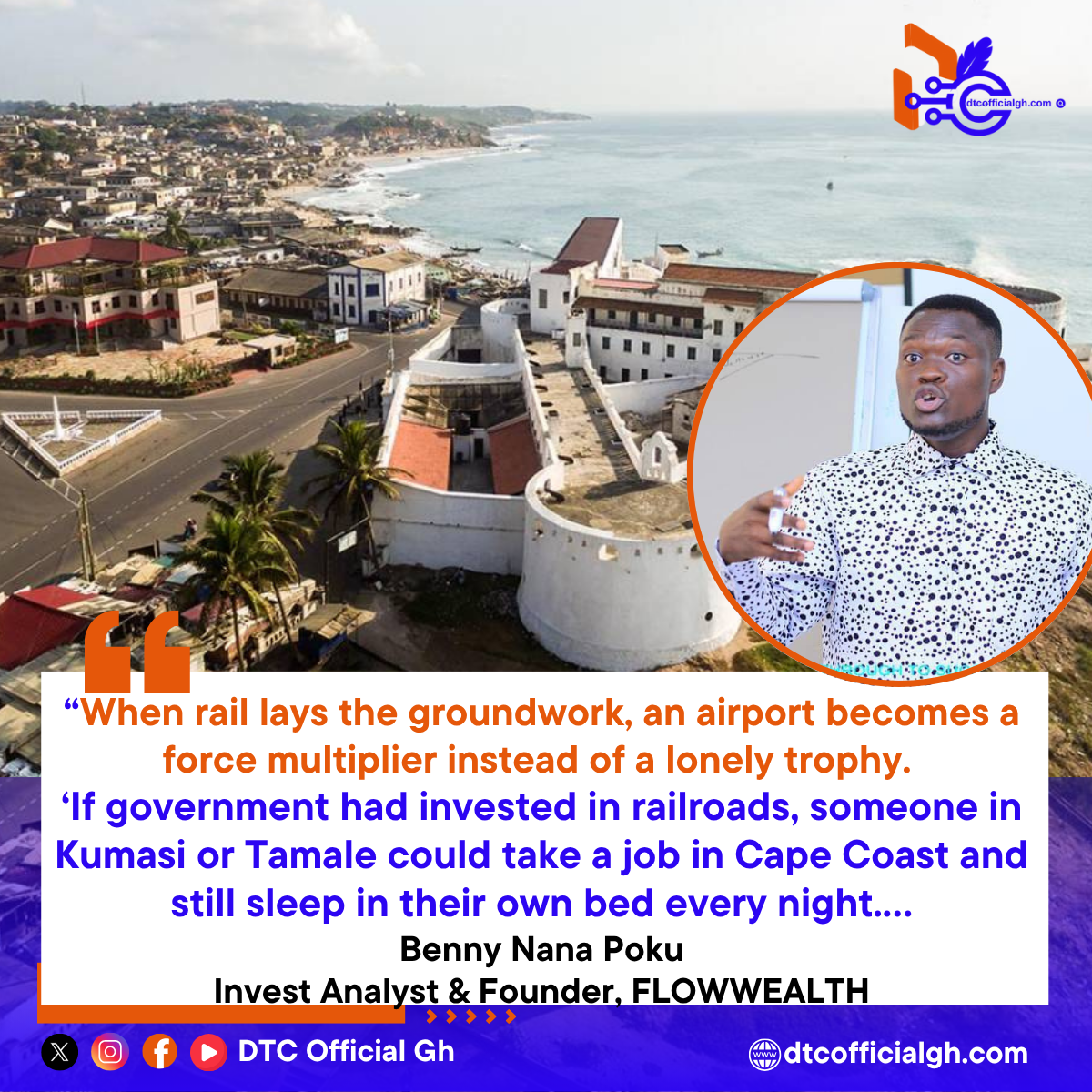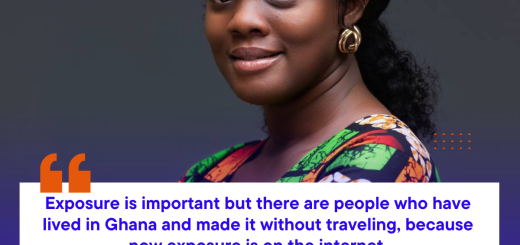Building Cape Coast as a Business City Starts on the Ground, Not in the Air

Not so long ago, I posted on Facebook that I didn’t quite understand why Cape Coast needed an airport, after all, it isn’t a “business city.”
The reply that followed from Benny Lloker was a master class in vision-driven development. His words shook loose my assumptions, so I’m turning his comment into the starting point for a wider conversation about what makes a city thrive.

The Heart of Benny’s Argument
Benny’s core point is disarmingly simple: business cities aren’t born; they’re built.
Cape Coast already has two priceless assets: education and tourism, but these assets can’t flourish without modern infrastructure that connects people, ideas, and capital.
“If government had invested in railroads, someone in Kumasi or Tamale could take a job in Cape Coast and still sleep in their own bed every night.” —Benny Lloker
That single sentence reframes the debate. The obstacle isn’t the absence of an airport; it’s the absence of reliable, affordable, high-capacity ground transport linking Cape Coast to the rest of Ghana. Fast trains would shorten economic distances, unlock labour mobility, and trigger a domino effect:
For more insights and inspiring stories , kindly follow us on Twitter and WhatsApp for more.
- Real estate growth: Developers would race to build homes for commuters and students.
- Industrial clusters: Entrepreneurs would set up processing plants, tech parks, and creative hubs, knowing that talent can flow in daily.
- Work-integrated education: Senior high students could intern at these hubs during vacation, gaining real-world skills without leaving their families.
- Tourism uplift: Cape Coast Castle, Kakum canopy walk, and pristine beaches would go from “long weekend” trips to effortless day excursions for locals and foreigners alike.
- Agro-investment: Farmers (myself included!) could inspect out-grower farms and return home the same day, slashing time and fuel costs.
Also from the Benny: 8 Investment Principles of a Billionaire and Investor, Bill Ackman
Benny pegs the combined potential of education and tourism alone at US$10 billion, a figure that sounds audacious until you remember that Dubai’s tourism receipts crossed US$29 billion in 2023 after three decades of relentless infrastructure bets.
Airports vs. Rail: A False Choice
Airports do matter. They attract conferences, high-value exports, and global investors. But in a country where most trips are domestic and most travellers are price-sensitive, rail delivers the broad-based lift first. It’s the circulatory system that keeps the city alive between take-offs and landings.
Think of it this way:
| Metric | Modern Rail Corridor | Regional Airport |
|---|---|---|
| Daily passenger capacity | 10,000+ | 1,000–2,500 |
| Ticket affordability | Low to moderate | Moderate to high |
| Freight capability | High (bulk goods) | Limited (high-value, low-volume) |
| Catalytic effect on housing & SMEs | Very High | Moderate |
| Build-out cost per km | Lower | Higher |
When rail lays the groundwork, an airport becomes a force multiplier instead of a lonely trophy.
Learning from Elsewhere
- Lagos–Ibadan Standard Gauge: Within two years of launch, property values around Ibadan shot up 30 percent, and tech firms opened satellite offices there.
- Madrid–Sevilla AVE: The line transformed Sevilla into a commuter city for Madrid, cutting 2.5 hours off travel time and boosting regional GDP.
- Dubai Metro: Built after the airports, but the metro’s reach doubled hotel occupancies along the line and nudged Dubai from car-centric to visitor-friendly.
Cape Coast can flip that order: start with rail, layer on smart roads, then crown the system with an airport once the passenger and cargo flows justify it.
READ ALSO: Rethinking Africa: Free Movement and Trade for a Borderless Continent
A Vision Worth Sweating For
Benny invokes Dubai for a reason: the desert metropolis wasn’t “meant” to be a global city either. Vision, grit, and petrodollars made it happen. Ghana may not have oil wealth at that scale, but we do have human capital, political stability, and strategic geography. Those, coupled with targeted infrastructure, can rewrite Cape Coast’s destiny.
So here’s the challenge to policymakers, investors, and we, the citizens:
- Demand a national rail master-plan that links Accra, Kumasi, Tamale, Takoradi, and Cape Coast on high-speed or at least high-reliability tracks.
- Zone for mixed-use development around future Cape Coast stations, schools, business parks, residential towers, and retail.
- Create tax incentives for industries that anchor campuses or factories within 20 km of the city.
- Embed work-experience programs into senior-high curricula so students plug directly into the new economy.
- Market Cape Coast globally as a study-and-play destination, bundling school placements with eco-tourism packages.
ALSO from Benny: You Don’t Build a House by Decorating the Rooftop
Changing the Narrative, One Track at a Time
Cape Coast doesn’t need to wait for a runway to take off. It needs the steel arteries of rail, the concrete veins of good roads, and the beating heart of its schools and historic sites.
If we get that right, the airport will follow, not as a rescue mission, but as the crowning infrastructure of a city already humming with life.
The next time you hear someone say “Cape Coast isn’t a business city,” remember Benny Lloker’s reminder: business cities are made, not found. Let’s pick up the shovel, lay the tracks, and build the future we keep talking about.
For more insights and inspiring stories , kindly follow us on Twitter and WhatsApp for more.
What’s your take? Should rail lead the charge, or does Cape Coast deserve an airport now? Share your thoughts in the comments, and let’s keep the conversation (and the trains) moving.





1 Response
[…] READ ALSO: Building Cape Coast as a Business City Starts on the Ground, Not in the Air […]